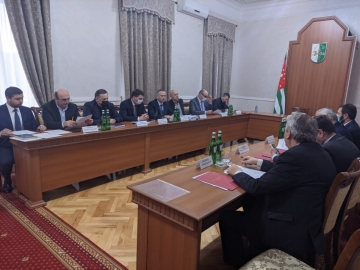Opening the meeting, Vice President, Chairman of the working group Badra Gunba said: “This working group includes experienced people, including representatives of the business community, scientists, experts in the field of economics, banking system, heads of government bodies. You know that during the entire post-war period there were several attempts to create and organize the work of such working groups, but the result of their activity is known to everyone. This is not a rebuke to those people who were involved in this work. But there are objective reasons why our economy cannot develop effectively. Over the years, we have also developed serious conceptual documents, which, unfortunately, remained only on paper. I consider it necessary to propose new steps for the implementation of the outlined plans. I think that the work of the group should be carried out within six months, otherwise it will drag on and turn into a long discussion, from which there will be no effect. "
According to Gunba, the task of the working group is to determine the most promising and priority areas of the state's economic policy, submit them for consideration to President, who, in turn, will issue them in the form of instructions, and the deadlines for the plans implementation will be agreed.
All members of the working group shared their proposals on determining the priority directions for the development of the economy of Abkhazia.
The head of Sukhum Town Administration Beslan Eshba proposed to develop a law on public-private partnership, which, in his opinion, could become a tool for attracting investments. He also suggested introducing project financing to regulate banks during project implementation.
Head of the Department of Economic Theory of ASU, Associate Professor Alexander Stranichkin proposed to create an urban planning code to attract investments. Stranichkin believes that it is necessary to solve the oil problem: "If we have oil, we need to decide whether we will extract it or not." In his opinion, as the world experience shows, oil gives great chances for development.
Pavel Sigal, First Vice President of the All-Russian Public Organization for Small and Medium-Sized Businesses Opora Rossii, recommended creating conditions for a favorable investment climate: “Abkhazia has the advantage of making all decisions quickly and efficiently, given the small size of the country. I believe that the key moment in republic's development is the creation of institutions for attracting and protecting investments. Such a tool can be any development corporation, the management structure of which will be determined by a special law. It is also necessary to reform the banking system and attract cheap Russian money through banks. The tax system must be changed. While the state is worried about low tax collections from small businesses in the field of tourism, arrears from state corporations amount to billions of rubles. "
According to Sigal, “there is no need to fantasize with oil production”, it is necessary to develop what is on the surface, that is, tourism, agriculture, food processing, seafood.
Director of the State Cadastral Chamber David Iradyan noted that there will be no investment without the involvement of real estate in the turnover: “It is necessary to regulate land and property relations. There will always be a source of money, if there are conditions. No investor will invest in real estate if it cannot be used as property or at least as a security right. It is not necessary to irrevocably transfer real estate to investors, it can be some kind of equity participation. "
Vyacheslav Chirikba, director of the Center for Strategic Studies under President, proposed creating a model for economic development of the state. At the same time, he noted that "there is no need to create a bicycle", but we can learn from small developed countries experience.
According to Chirikba, the biggest problem in the Abkhaz economy is conservatism, no one wants to take risks and change something, but it is necessary to change, because if we do not change, then we will lag far behind the whole world. Therefore, Abkhazia has been pregnant with reforms in all areas for a long time, but it cannot give them birth in any way. The second problem is the lack of intellectual resources in the field of management and consulting ”.




